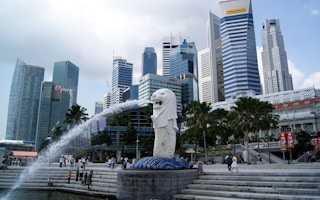On June 8, leaders from the largest advanced economies will gather for the annual G7 summit to discuss the most pressing challenges the world faces. Most of the items on the agenda—from climate change to inequality— resonate particularly strongly for people living in urban areas, who comprise 54 per cent of the world’s population.
To continue reading, subscribe to Eco‑Business.
There's something for everyone. We offer a range of subscription plans.
- Access our stories and receive our Insights Weekly newsletter with the free EB Member plan.
- Unlock unlimited access to our content and archive with EB Circle.
- Publish your content with EB Premium.
And yet, municipal governments will not be represented in any official capacity during the G7 meetings. This is a mistake; if the world’s biggest problems are to be solved, cities must become part of the conversation.
Historically, cities have played a marginal role in global debates. In the United States, for example, early cities were rife with corruption and factionalism; local politics was messy enough. But today’s urban centers are economically stronger and politically bolder.
Twenty-first-century cities’ determination to act in their own interests became clear in late 2017, when more than 50 US mayors pledged to meet the commitments of the 2015 Paris climate agreement—directly challenging President Donald Trump’s withdrawal from the deal.
This week, leaders from Montreal and 10,000 other cities around the world will deliver a similar message to the G7. They will present a declaration that includes a diverse collection of municipal views on the summit’s key themes, and urge national governments to collaborate more closely with their local counterparts.
“
Twenty years from now, we will see an inflection point where the nation-state is in decline, and the city-state à la Singapore is driving the cultural and economic activity.
Rahm Emanuel, mayor, Chicago
These demands, and the manner in which they are being made, will be a first for a G7 meeting. The goal is to make this the norm. Still, even without a seat at the table, many of the world’s megacities—powered by strong human capital, competitive markets, and widespread appeal—are already working to build a more progressive, inclusive, and sustainable future.
From Buenos Aires to Tokyo, city leaders are making their concerns known globally—often irrespective of national agendas. Small and mid-sized cities are also raising their international profiles.
By investing in “smart” and “resilient” urban planning, governments from Bordeaux in France to Curitiba in Brazil are strengthening their brand identities and luring talent, investment, and businesses from around the world.
The American-Canadian author and urban activist Jane Jacobs famously observed that cities are the true engines of national prosperity. Cities power growth through innovation, trade, and exchange. And city services are often more visible to citizens than federal aid; consider, for example, who responds during a traffic accident or a natural disaster.
To be sure, today’s cities face many challenges. As urban areas have grown, leaders have been forced to change how they plan. Amid tightening budgets, city governments are moving away from overly bureaucratic systems toward those that encourage greater levels of entrepreneurship.
But, as Chicago Mayor Rahm Emanuel noted last month, this has been positive for many cities, allowing them to become testing grounds for the future of mobility, work, housing, energy, education, and health. “Twenty years from now,” Emanuel told fellow mayors in New York City, we will see “an inflection point where the nation-state is in decline, and the city-state à la Singapore is driving the cultural and economic activity.”
Of course, not all cities have the same resources, influence, or needs as Chicago or Singapore. But any city leader nowadays can appreciate the importance of standing on the frontlines of change. Inspired by this solidarity, and connected through international networks like Metropolis, C40 Cities, and 100 Resilient Cities, municipal leaders everywhere are forging partnerships to create united urban agendas.
At nearly every turn, on just about every major issue, national governments are failing to deliver solutions, while city leaders continue to inspire public confidence. According to a 2017 survey by the Centre for Political Research at Sciences Po, 64 per cent of French adults believe their local mayor is working harder than the executive branch to solve everyday problems.
No doubt many other urbanites feel the same way. This is an opportune time for city leaders to become global players. When gatherings like the G7 summit are convened to discuss the world’s most difficult challenges, the people closest to those challenges, who are likely to have the most valuable insights concerning how to overcome them, should be in the room.
Sébastien Turbot is Executive Director of the NewCities Foundation.
Copyright: Project Syndicate, 2018.









